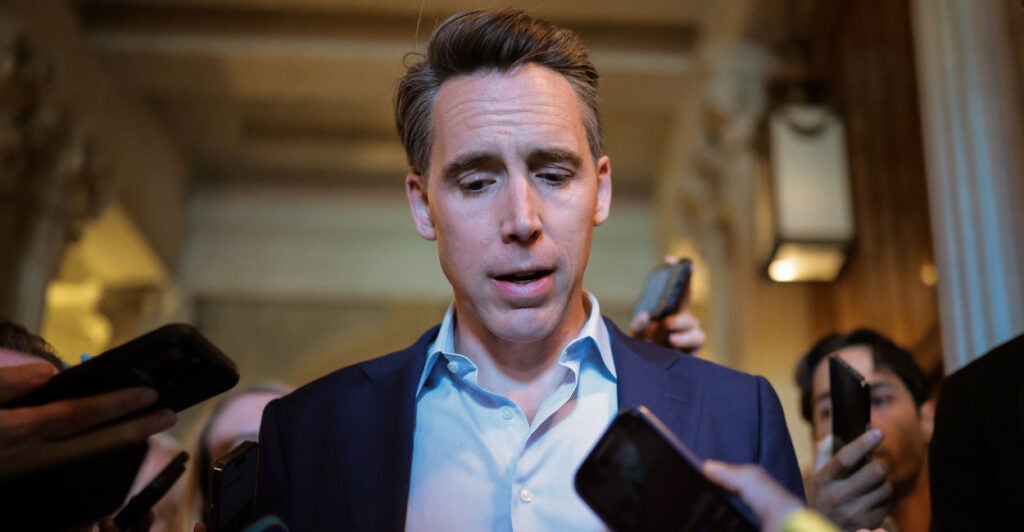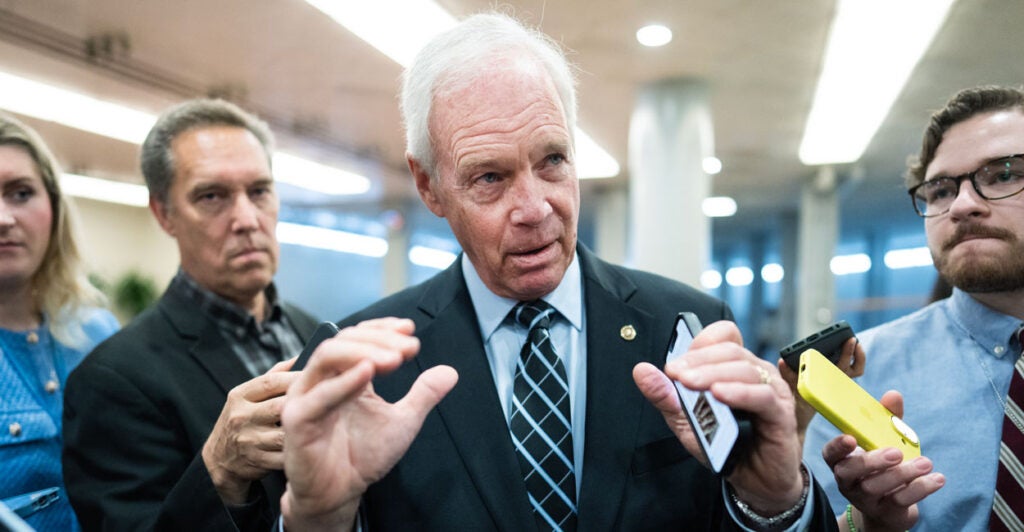As Senate Republican leadership rushes to pass the “big, beautiful” budget reconciliation bill, the math to get to a GOP consensus in both houses of Congress has suddenly gotten much harder.
The “big, beautiful bill,” a 10-year budget package, is the main legislative vehicle for delivering on President Donald Trump’s campaign promises and can be passed by a simple majority in the House and Senate alike.
The bill would provide funding for border security and deportations, while also extending Trump’s first-term 2017 tax cuts before their expiration at the end of the year.
But various factions have drawn red lines on issues such as overall spending levels, benefits reforms, tax policy, and Biden-era green energy policies.
These competing interests and varied interpretations of the new Republican movements’ priorities could threaten the bill’s passage. One way or another, something’s got to give, and lawmakers’ “red lines” will have to be redrawn.
Here are the main players putting their foot down on nonnegotiable issues.
Senate Republicans: Don’t Touch Medicaid
Taxpayer-funded health care, which makes up a massive share of the federal budget, has become an electrified “third rail” in American politics, as Republicans’ attempt to repeal Obamacare preceded a demoralizing electoral defeat in the 2018 midterms.
For Senate Majority Leader John Thune, R-S.D., winning over Medicaid-reform skeptics is essential for passing the budget reconciliation bill.

As of now, there are enough Republicans calling for a moderation of Medicaid reforms to have a say over whether or not the bill passes.
Among the most outspoken GOP senators warning against aggressive Medicaid restructuring are Josh Hawley of Missouri, Susan Collins of Maine, Lisa Murkowski of Alaska, Jim Justice of West Virginia, and Jerry Moran of Kansas.
To be sure, the full number of Republicans expressing nervousness and reservations about Medicaid reforms goes well beyond those five.
It’s one of the trickiest issues to resolve, as Medicaid reforms make up an almost $1 trillion portion of the House bill’s projected 10-year spending cuts.
Green Energy Republicans
One of the deals that won over the fiscal hawk House Freedom Caucus to support the package in May was a last-minute agreement to speed up the expiration of Biden-era green energy tax credits and subsidies.
Now, a large group of Republicans—which overlaps with the Medicaid defenders—is calling for those expiration dates to be eased.
Sen. Thom Tillis, R-N.C., is among the most outspoken of those senators, and has argued that scrapping green energy incentives would harm the business environment.
He has called changes to these incentives “void of any understanding of just how these supply chains work.”
Sens. John Hoeven, R-N.D., and Shelley Moore Capito, R-W.Va., have also suggested tweaking the House’s work of undoing green energy incentives.
Freedom Caucus Won’t Support Watered-Down Bill
Passing a heavily amended bill through the Senate is one thing, but subsequently getting it back through the House of Representatives again would be a Herculean task.
The House Freedom Caucus—composed largely of Republicans who view the national debt as a dire crisis—has signaled it will not support a Senate bill that undoes last-minute House deals on repealing Biden green energy policies and implementing more aggressive Medicaid reforms.
“We Stand Firm—No Senate Rollbacks of Conservative Wins,” the caucus said in a recent statement posted to X.
“We want to be crystal clear: if the Senate attempts to water down, strip out, or walk back the hard-fought spending reductions and … Green New Scam rollbacks achieved in this legislation, we will not accept it.”
Senate Fiscal Hawks
There are at least four Senate Republicans who have voiced concerns about overall deficit levels in the big, beautiful bill: Sens. Ron Johnson of Wisconsin, Rick Scott of Florida, Rand Paul of Kentucky, and Mike Lee of Utah.
That’s yet another bloc in the Senate that could have a say over whether the bill passes.
These senators all demand a steep increase in spending cuts, but have not yet coalesced around a plan to negotiate for that goal as a united front.
Johnson wants the process to be redone, with the bill split into multiple parts.
One bill would bank savings, extend tax cuts, and raise the debt limit, while another would be a “forensic analysis” that would bring the federal budget back to an inflation-adjusted, pre-COVID-19 pandemic spending level.
Johnson seems serious about it, too.
“I recommend they don’t dare me,” he told The Daily Signal when asked what he would do if Senate leadership simply dared him to vote against a bill that would fulfill Trump’s campaign promises.
“Work with me, and let’s do something that can pass, something that I can support.”

Paul, meanwhile, also wants spending reductions and has voiced skepticism over the Trump administration’s expensive funding requests for border wall construction.
Paul’s main sticking point seems to be the debt limit, which he thinks is being raised too high.
“I think it’s a terrible idea to do this,” he has said of raising the debt ceiling by $5 trillion. “You can say it doesn’t directly add to the debt, but if you increase the ceiling $5 trillion, you’ll meet that.”
Lee, on the other hand, has said “there’s still time to fix” the bill by making it more conservative, and is pushing for more cost-saving provisions, such as an amendment to sell off federal lands. That provision was thrown out of the House bill.
SALT Caucus
No Senate Republicans like SALT deductions.
A SALT deduction allows residents in high-tax states to deduct their state and local taxes on their federal tax returns. Under Trump’s first-term 2017 tax cuts—set to expire at the end of the year—taxpayers can deduct up to $10,000 on their returns under SALT.
Speaker of the House Mike Johnson, R-La., raised the SALT cap to $40,000 to appease blue-state Republican holdouts—one of the last-minute deals that ensured the bill’s passage through the House.
Some of the SALT advocates are now saying they will reject any bill that alters that agreement.
“If the Senate changes the SALT deduction in any way, I will be a no, and I’m not going to buckle on that. And I know in speaking to my other colleagues, they will be a no as well,” Rep. Mike Lawler, R-N.Y., warned in a recent CNN interview.
Is There an Alternative?
Given the complicated calculus of writing a bill that can please both the Senate and the House, some members are looking for new pay-fors that will provide more flexibility.
Tillis, for example, told The Daily Signal that improving the auditing of Medicare and Medicaid could unearth big savings.
“There are enormous savings to be had if we create programs and we provide people technology and infrastructure to do it. If you just do nothing more than leverage the analytics programs that CMS has, and you get a good program office in there, you can very quickly drive out savings,” he said, referring to the Centers for Medicare and Medicaid Services.”
Sen. Ted Cruz, R-Texas, has also proposed radical monetary reform, such as having the Federal Reserve cease paying interest on bank reserves.
“For most of the history of the Federal Reserve, they did not pay interest on reserves held by banks,” Cruz has said. “And so eliminating that would save a trillion dollars over 10 years.”
The ball is in the Senate’s court to come up with some plan that delivers the savings House fiscal hawks are demanding, while also settling disagreements on controversial benefits reforms.
Sen. Lindsey Graham, R-S.C., has suggested that the Senate can find a way to make the bill more fiscally conservative than the House’s version.
“I think the Senate making the bill more fiscally responsible will actually help with the House,” he told The Daily Signal on Friday.












